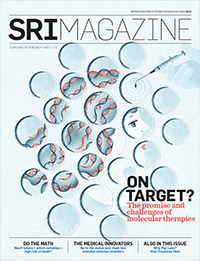Features
Messages
Digest
Short Stories
Walk This Way

Study participant Deirdre Breton walks on a treadmill at Sunnybrook Research Institute. The study measured the effects of dual tasking on the brain.
Photo: Doug Nicholson
It turns out that walking and talking is more complex than one might think.
“Walking is actually a cognitive activity,” says Dr. Sandra Black, neurologist and director of the Brain Sciences Research Program at Sunnybrook Research Institute. “People usually walk for a purpose—to get somewhere or do something. ”
For people with certain brain disorders, walking is challenging. That’s because the brain regions responsible for higher-level thinking and attention are also involved in gait and balance. Given that walking and attention use some of the same neural pathways, Black and colleagues wanted to understand the effects of walking and paying attention at the same time, called “dual tasking.” They examined this in healthy seniors and patients with Alzheimer’s disease (AD), who had varying degrees of white matter disease, which appears as white spots and patches of bright signal on magnetic resonance imaging brain scans.
They asked healthy seniors and AD patients to perform attention and recall tests while walking on a treadmill. Participants had to keep track of sequences of letters flashed on a screen for one-and-a-half seconds, pressing a buzzer when a letter was the same as the last one or the second-last one seen.
“Participants had to make a trade-off between ‘do I get the answer right, or do I try to keep my balance?’ We wanted to understand how these trade-offs were made,” says Black.
Unlike the healthy people who took more steps to maintain stability, AD patients slowed down while dual-tasking, which meant they spent less time with both feet on the ground, and thus increased their tendency to fall. This effect was even worse in AD patients with white matter disease.
One goal is to help patients become aware of their tendency to fall when distracted, and to train them to improve their balance and awareness.
It’s a matter of taking things one step at a time.
— Alisa Kim
This research was funded by the Alzheimer’s Association, Alzheimer’s Society of Canada, Canadian Institutes of Health Research, Canada Foundation for Innovation, Canadian Partnership for Stroke Recovery and University of Pittsburgh.




